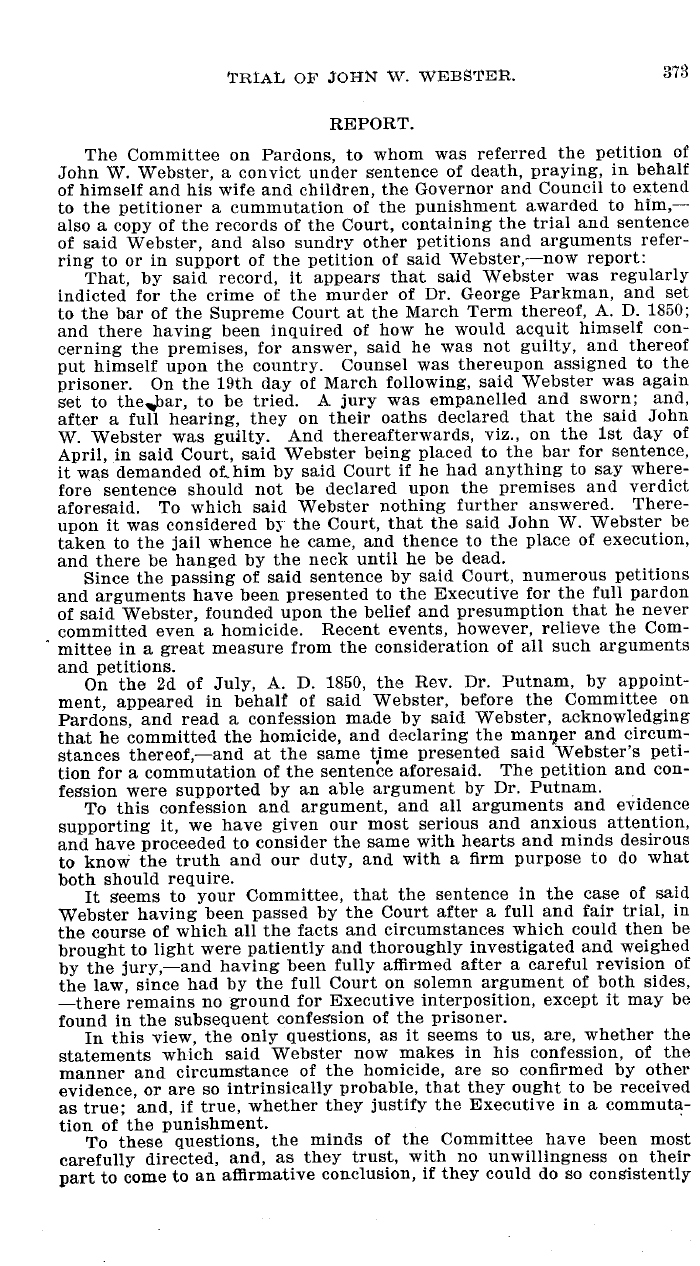|
TRIAL OP JOHN vv. WEBSTER. 3978
REPORT.
The Committee on Pardons, to whom was referred the petition of
John W. Webster, a convict under sentence of death, praying, in behalf
of himself and his wife and children, the Governor and Council to extend
to the petitioner a cummutation of the punishment awarded to him,-
also a copy of the records of the Court, containing the trial and sentence
of said Webster, and also sundry other petitions and arguments refer-
ring to or in support of the petition of said Webster,-now report:
That, by said record, it appears that said Webster was regularly
indicted for the crime of the murder of Dr. George Parkman, and set
to the bar of the Supreme Court at the March Term thereof, A. D. 1850;
and there having been inquired of how he would acquit himself con-
cerning the premises, for answer, said he was not guilty, and thereof
put himself upon the country. Counsel was thereupon assigned to the
prisoner. On the 19th day of March following, said Webster was again
set to the„bar, to be tried. A jury was empanelled and sworn; and,
after a full hearing, they on their oaths declared that the said John
W. Webster was guilty. And thereafterwards, viz., on the 1st day of
April, in said Court, said Webster being placed to the bar for sentence,
it was demanded of, him by said Court if he had anything to say where-
fore sentence should not be declared upon the premises and verdict
aforesaid. To which said Webster nothing further answered. There-
upon it was considered bi the Court, that the said John W. Webster be
taken to the jail whence he came, and thence to the place of execution,
and there be hanged by the neck until he be dead.
Since the passing of said sentence by said Court, numerous petitions
and arguments have been presented to the Executive for the full pardon
of said Webster, founded upon the belief and presumption that he never
committed even a homicide. Recent events, however, relieve the Com-
mittee in a great measure from the consideration of all such arguments
and petitions.
On the 2d of July, A. D. 1850, the Rev. Dr. Putnam, by appoint-
ment, appeared in behalf of said Webster, before the Committee on
Pardons, and read a confession made by said Webster, acknowledging
that he committed the homicide, and declaring the man4er and circum-
stances thereof,-and at the same time presented said Webster's peti-
tion for a commutation of the sentence aforesaid. The petition and con-
fession were supported by an able argument by Dr. Putnam.
To this confession and argument, and all arguments and evidence
supporting it, we have given our most serious and anxious attention,
and have proceeded to consider the same with hearts and minds desirous
to know the truth and our duty, and with a firm purpose to do what
both should require.
It seems to your Committee, that the sentence in the case of said
Webster having been passed by the Court after a full and fair trial, in
the course of which all the facts and circumstances which could then be
brought to light were patiently and thoroughly investigated and weighed
by the jury,-and having been fully affirmed after a careful revision of
the law, since had by the full Court on solemn argument of both sides,
-there remains no ground for Executive interposition, except it may be
found in the subsequent confession of the prisoner.
In this view, the only questions, as it seems to us, are, whether the
statements which said Webster now makes in his confession, of the
manner and circumstance of the homicide, are so confirmed by other
evidence, or are so intrinsically probable, that they ought to be received
as true; and, if true, whether they justify the Executive in a commuta-
tion of the punishment.
To these questions, the minds of the Committee have been most
carefully directed, and, as they trust, with no unwillingness on their
part to come to an affirmative conclusion, if they could do so consistently
|

